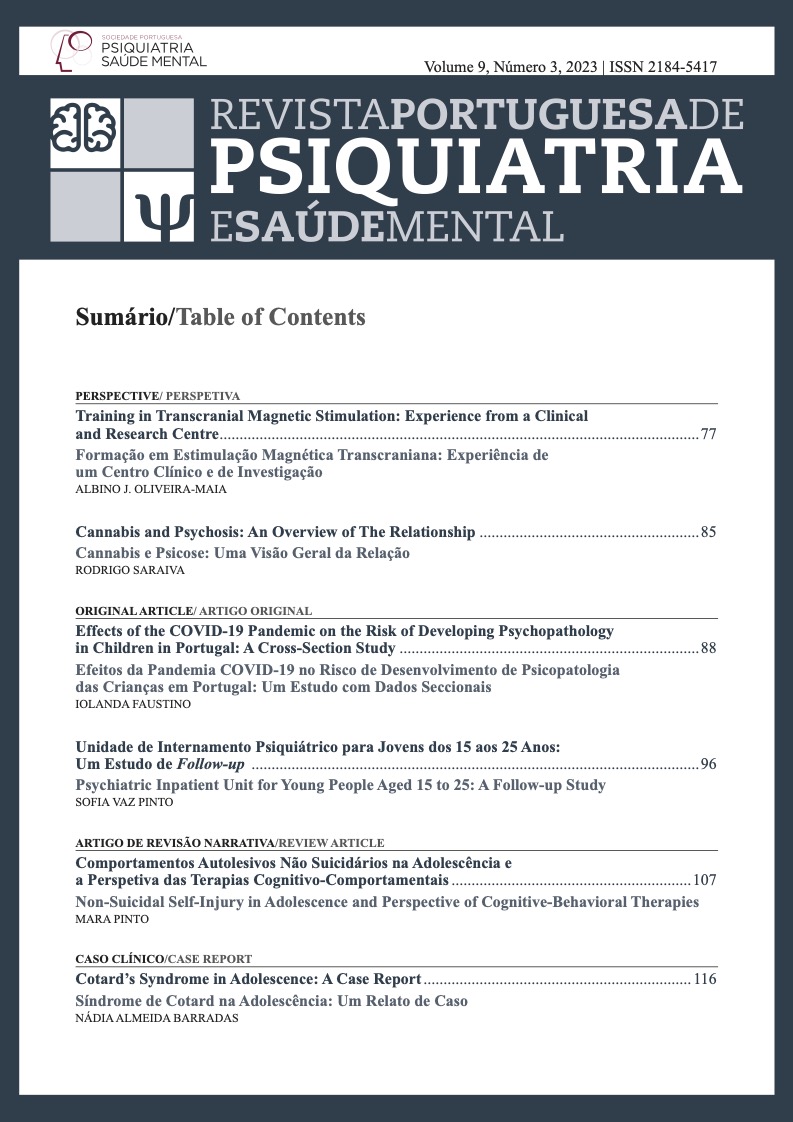Comportamentos Autolesivos Não Suicidários na Adolescência e a Perspetiva das Terapias Cognitivo-Comportamentais
DOI:
https://doi.org/10.51338/rppsm.390Palavras-chave:
Adolescente, Comportamentos Autolesivos/tratamento, Fatores de Risco, Terapia Cognitivo-ComportamentalResumo
Os comportamentos autolesivos, sejam eles suicidários ou não suicidários, constituem atualmente um incontornável problema de saúde pública, pela sua elevada incidência e impacto. Os comportamentos autolesivos não suicidários
são mais comuns na fase da adolescência, mesmo em jovens com um desenvolvimento normativo. A sua prevalência
é, contudo, consideravelmente superior na população clínica, com 50% a 60% dos adolescentes com psicopatologia
a apresentar episódios únicos ou repetidos de comportamentos autolesivos não suicidários. Estes comportamentos podem associar-se a mais do que uma causa e função, em resultado da interação entre múltiplos fatores de risco e de manutenção, como por exemplo, genéticos, biológicos, psiquiátricos, psicológicos, sociais e culturais. A prevalência significativa de comportamentos autolesivos não suicidários na população clínica e os desafios associados à abordagem destes jovens, seja numa componente de avaliação ou de intervenção, contribuem para a pertinência desta revisão narrativa cujos objetivos são a caracterização destes comportamentos e, por outro lado, a pesquisa de evidência sobre a vertente de avaliação e intervenção na perspetiva das terapias cognitivo-comportamentais.
Downloads
Referências
Guerreiro DF, Cruz D, Frasquilho D, Santos JC, Figueira ML, Sampaio D. Association Between Deliberate Self-Harm and Coping in Adolescents: A Critical Review of the Last 10 Years’ Literature. Arch Suicide Res. 2013;17: 91–105. doi:10.1080/13811118.2013.776439
Brown RC, Plener PL. Non-suicidal Self-Injury in Adolescence. Curr Psychiatry Rep. 2017;19:20. doi: 10.1007/s11920-017-0767-9.
Plener PL, Kaess M, Schmahl C, Pollak S, Fegert JM, Brown RC. Non-suicidal self-injury in adolescents. Dtsch Arztebl Int. 2018;115:23-30. doi: 10.3238/ arztebl.2018.0023.
Moran P, Coffey C, Romaniuk H, Olsson C, Borschmann R, Carlin JB, et al. The natural history of self-harm from adolescence to young adulthood: A population-based cohort study. Lancet. 2012;379: 236–43. doi:10.1016/S0140-6736(11)61141-0
Plener PL, Schumacher TS, Munz LM, Groschwitz RC. The longitudinal course of non-suicidal self-injury and deliberate self-harm: A systematic review of the literature. Borderline Personal Disord Emot Dysregul. 2015;2:2. doi: 10.1186/s40479-014-0024-3.
Gaspar S, Reis M, Sampaio D, Guerreiro D, de Matos MG. Non-suicidal Self-Injuries and Adolescents High Risk Behaviours: Highlights from the Portuguese HBSC Study. Child Indic Res. 2019;12: 2137–49. doi:10.1007/s12187-019-09630-w
American Psychiatric Association. Diagnostic and Statistical Manual of Mental Disorders. 5th ed. Chicago: American Psychiatric Association; 2013. doi:10.1176/ appi.books.9780890425596
Xiao Q, Song X, Huang L, Hou D, Huang X. Global prevalence and characteristics of non-suicidal self-injury between 2010 and 2021 among a non-clinical sample of adolescents: A meta-analysis. Front Psychiatry. 2022;13. doi:10.3389/FPSYT.2022.912441
Madge N, Hewitt A, Hawton K, Wilde EJ De, Corcoran P, Fekete S, et al. Deliberate self-harm within an international community sample of young people: Comparative findings from the Child & Adolescent Self-harm in Europe (CASE) Study. J Child Psychol Psychiatry Allied Discip. 2008;49: 667–77. doi:10.1111/j.1469-7610.2008.01879.x
Gillies D, Christou MA, Dixon AC, Featherston OJ, Rapti I, Garcia-Anguita A, et al. Prevalence and Characteristics of Self-Harm in Adolescents: Meta-Analyses of Community-Based Studies 1990–2015. J Am Acad Child Adolesc Psychiatry. 2018;57:733-41. doi: 10.1016/j.jaac.2018.06.018.
Kaess M, Parzer P, Mattern M, Plener PL, Bifulco A, Resch F, et al. Adverse childhood experiences and their impact on frequency, severity, and the individual function of nonsuicidal self-injury in youth. Psychiatry Res. 2013;206: 265272. doi:10.1016/j.psychres.2012.10.012
Matos MG, Simões C, Tomé G, Camacho I, Ferreira M, Ramiro L, et al. A Saúde dos Adolescentes Portugueses - Relatório do Estudo HBSC 2010. Lisboa: HBSC; 2011.
Matos MG, Simões C, Reis M. A Saúde dos Adolescentes Portugueses em tempos de recessão - Relatório do Estudo HBSC 2014. Lisboa: HBSC; 2015.
Guerreiro DF, Sampaio D, Figueira ML, Madge N. Self-Harm in Adolescents: A Self-Report Survey in Schools from Lisbon, Portugal. Arch Suicide Res. 2017;21: 83–99. doi:10.1080/13811118.2015.1004480
Guerreiro DF, Sampaio D, Rihmer Z, Gonda X, Figueira ML. Affective temperaments and self-harm in adolescents: A cross-sectional study from a community sample. J Affect Disord. 2013;151: 891–8. doi:10.1016/j.jad.2013.07.034
Klonsky ED. The functions of deliberate self-injury: A review of the evidence. Clinical Psychology Review. Clin Psychol Rev. 2007; 226–39. doi:10.1016/j. cpr.2006.08.002
Nock MK, Prinstein MJ. A functional approach to the assessment of self-mutilative behavior. J Consult Clin Psychol. 2004;72: 885–90. doi:10.1037/0022-006X.72.5.885
Glenn CR, Klonsky ED. Prospective Prediction of Nonsuicidal Self-Injury: A 1-Year Longitudinal Study in Young Adults. Behav Ther. 2011;42: 751–62. doi:10.1016/j.beth.2011.04.005
Walsh B. Clinical assessment of self-injury: A practical guide. Journal of Clinical Psychology. J Clin Psychol. 2007: 1057–68. doi:10.1002/jclp.20413
Garisch JA, Wilson MS, O’Connell A, Robinson K. Overview of assessment and treatment of non-suicidal self-injury among adolescents. NZ J Psychol. 2017;46: 98–105.
Faura-Garcia J, Orue I, Calvete E. Clinical assessment of non-suicidal self-injury: A systematic review of instruments. Clin Psychol Psychother. 2021;28: 739–65. doi:10.1002/CPP.2537
Hooley JM, Fox KR, Boccagno C. Nonsuicidal Self-Injury: Diagnostic Challenges And Current Perspectives. Neuropsychiatr Dis Treat. 2020;16: 101. doi:10.2147/NDT.S198806
Linehan MM, Comtois KA, Brown MZ, Heard HL, Wagner A. Suicide Attempt Self-Injury Interview (SASII): Development, reliability, and validity of a scale to assess suicide attempts and intentional self-injury. Psychol Assess. 2006;18: 303–12. doi:10.1037/1040-3590.18.3.303
Nock MK, Holmberg EB, Photos VI, Michel BD. Self-Injurious Thoughts and Behaviors Interview: Development, Reliability, and Validity in an Adolescent Sample. Psychol Assess. 2007;19: 309–17. doi:10.1037/1040-3590.19.3.309
Osman A, Bagge CL, Gutierrez PM, Konick LC, Kopper BA, Barrios FX. The suicidal behaviors questionnaire-revised (SBQ-R): Validation with clinical and nonclinical samples. Assessment. 2001;8: 443–54. doi:10.1177/107319110100800409
Campos RC, Holden RR. Portuguese Version of the Suicidal Behaviors Questionnaire-Revised: Validation Data and the Establishment of a Cut-Score for Screening Purposes. Eur J Psychol Assess. 2019;35: 190–5. doi:10.1027/1015-5759/a000385
Klonsky ED, Glenn CR. Assessing the Functions of Non-suicidal Self-injury: Psychometric Properties of the Inventory of Statements about Self-injury (ISAS). J Psychopathol Behav Assess. 2009;31: 215–9. doi:10.1007/s10862-008-9107-z
Duarte E, Gouveia-Pereira M, Gomes HS. Development and Factorial Validation of the Inventory of Deliberate Self-Harm Behaviours for Portuguese Adolescents. Psychiatr Q. 2019;90: 761–76. doi:10.1007/ s11126-019-09660-1
Izadi-Mazidi M, Yaghubi H, Mohammadkhani P, Hassanabadi H. Assessing the functions of non-suicidal self-injury: Factor analysis of functional assessment of self-mutilation among adolescents. Iran J Psychiatry. 2019;14: 184–91. doi:10.18502/ijps.v14i3.1319
Gratz KL. Measurement of deliberate self-harm: Preliminary data on the deliberate self-harm inventory. J Psychopathol Behav Assess. 2001;23: 253–63. doi:10.1023/A:1012779403943
Latimer S, Covic T, Cumming SR, Tennant A. Psychometric analysis of the Self-Harm Inventory using Rasch modelling. BMC Psychiatry. 2009;9: 1–9. doi:10.1186/1471-244X-9-53
Washburn JJ, Juzwin KR, Styer DM, Aldridge D. Measuring the urge to self-injure: Preliminary data from a clinical sample. Psychiatry Res. 2010;178: 540–4. doi:10.1016/j.psychres.2010.05.018
Vrouva I, Fonagy P, Fearon PRM, Roussow T. The risk-taking and self-harm inventory for adolescents: Development and psychometric evaluation. Psychol Assess. 2010;22: 852–65. doi:10.1037/a0020583
Xavier A, Cunha M, Pinto-Gouveia J. Validation of the Risk-Taking and Self-Harm Inventory for Adolescents in a Portuguese Community Sample. Meas Eval Couns Dev. 2019;52: 1-14. doi: 10.1080/07481756.218.1435189
Carvalho CB, Nunes C, Castilho P, da Motta C, Caldeira S, Pinto-Gouveia J. Mapping non suicidal self-injury in adolescence: Development and confirmatory factor analysis of the impulse, self-harm and suicide ideation questionnaire for adolescents (ISSIQ-A). Psychiatry Res. 2015;227: 238–45. doi:10.1016/j. psychres.2015.01.031
Chávez-Flores YV, Hidalgo-Rasmussen CA, Yanez-Peñúñuri LY. Assessment tools of non-suicidal self-injury in adolescents 1990-2016: A systematic review. Ciencia Saude Coletiva. 2019; 2871–82. doi:10.1590/1413-81232018248.18502017
Kress V, Hoffman R. Non-Suicidal Self-Injury and Motivational Interviewing: Enhancing Readiness for Change. J Ment Heal Couns. 2008;30: 311–29. doi:10.17744/mehc.30.4.n2136170r5732u6h
Witt KG, Hetrick SE, Rajaram G, Hazell P, Taylor Salisbury TL, Townsend E, et al. Interventions for self-harm in children and adolescents. Cochrane Database Syst Rev. 2021;3:CD013667. doi: 10.1002/14651858. CD013667.pub2.
Ougrin D, Tranah T, Stahl D, Moran P, Asarnow JR. Therapeutic interventions for suicide attempts and self-harm in adolescents: Systematic review and meta-analysis. J Am Acad Child Adolesc Psychiatry. 2015;54:97-107.e2. doi: 10.1016/j.jaac.2014.10.009.
Washburn JJ, Richardt SL, Styer DM, Gebhardt M, Juzwin KR, Yourek A, et al. Psychotherapeutic approaches to non-suicidal self-injury in adolescents. Child Adolesc Psychiatry Ment Health. 2012;6: 14. doi:10.1186/1753-2000-6-14
Bettis AH, Liu RT, Walsh BW, Klonsky ED. Treatments for Self-Injurious Thoughts and Behaviors in Youth: Progress and Challenges. Evidence-based Pract child Adolesc Ment Heal. 2020;5: 354. doi:10.1080/23 794925.2020.1806759
Kaess M, Edinger A, Fischer-Waldschmidt G, Parzer P, Brunner R, Resch F. Effectiveness of a brief psychotherapeutic intervention compared with treatment as usual for adolescent nonsuicidal self-injury: a single-centre, randomised controlled trial. Eur Child Adolesc Psychiatry. 2020;29: 881–91. doi:10.1007/ s00787-019-01399-1
Mehlum L, Ramberg M, Tørmoen AJ, Haga E, Diep LM, Stanley BH, et al. Dialectical Behavior Therapy Compared with Enhanced Usual Care for Adolescents with Repeated Suicidal and Self-Harming Behavior: Outcomes over a One-Year Follow-Up. J Am Acad Child Adolesc Psychiatry. 2016;55: 295–300. doi:10.1016/j.jaac.2016.01.005
DeCou CR, Comtois KA, Landes SJ. Dialectical Behavior Therapy Is Effective for the Treatment of Suicidal Behavior: A Meta-Analysis. Behav Ther. 2019;50: 60–72. doi:10.1016/j.beth.2018.03.009
Asarnow JR, Berk MS, Bedics J, Adrian M, Gallop R, Cohen J, et al. Dialectical Behavior Therapy for Suicidal Self-Harming Youth: Emotion Regulation, Mechanisms, and Mediators. J Am Acad Child Adolesc Psychiatry. 2021;60:1105-15.e4. doi: 10.1016/j. jaac.2021.01.016.
Pardo ES, Rivas AF, Barnier PO, Mirabent MB, Lizeaga IK, Cosgaya AD, et al. A qualitative research of adolescents with behavioral problems about their experience in a dialectical behavior therapy skills training group. BMC Psychiatry. 2020;20:245. doi:10.1186/ S12888-020-02649-2/FIGURES/1
Mehlum L. Mechanisms of change in dialectical behaviour therapy for people with borderline personality disorder. Curr Opin Psychol. 2021;37: 89–93. doi:10.1016/J.COPSYC.2020.08.017
Van KJ, Geneviève V, Kalnins RC, Van Vliet K, Kalnins G. A Compassion-Focused Approach to Nonsuicidal Self-Injury. J Ment Heal Couns. 2011. doi:10.17744/ MEHC.33.4.J7540338Q223T417








